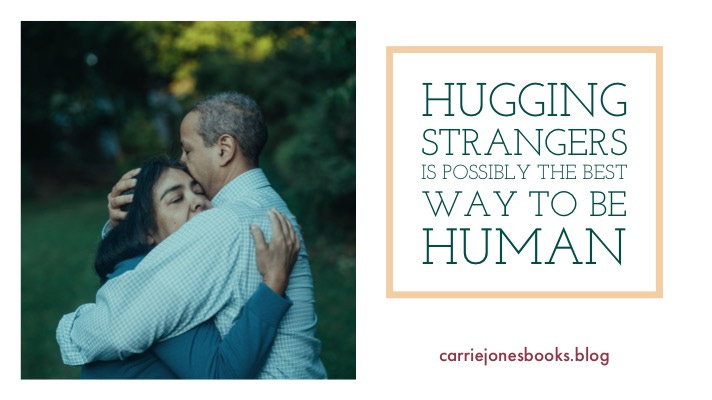She had stayed at our camper site for nine years, not continuously, but for a couple weeks at a time each summer while her husband came to Maine to abandon the Alabama summer heat. She’d had to stay home and work those summers, visiting him twice. They thought they’d spend a lot more time here soon.
But this year, she walks across the campground road (Road 4) towards me, in a black summer dress, loosely draped across her body. She is half slow, half purposeful, which means that she’s trying to do something that’s hard to do. I stand up from the picnic table where I’m working and meet her.
Her arms open wide. Her hands shake and she says, “This … this used to be our campsite.”
And I instantly know who she is.
“Oh,” I say. “I’m so sorry.”
I have no words.
I open my arms and she steps right into them, this stranger who is not a stranger. This stranger who is human like me.
It’s our first of three hugs.
Her husband died last year, in between summers, and she sold the fifth-wheel that they stayed in. Someone is possibly using it for transient agricultural workers up in the Machias area. She’s not sure.
“Our shed was right here. There was a deck, a huge deck right here. They took all of it.” She shakes her head.
Her husband built the deck. He had her antique music box in the shed and the music would play out into the road. All their friends were here, a group of 60 to 70-year-olds, mostly, and they would gather every night, talking, laughing. Her husband kept one man from drinking for the six weeks they were together here. He built a deck with a baby gate (for free) for a wormer and his wife because they had an 18-month-old baby and the wife was always alone with the baby, always watching it, always exhausted and trapped.
“He’d spell her for a half hour or an hour each day. She couldn’t believe how kind that was,” the woman tells me and she breaks down again.
“Everything is so different. Our shed,” she repeats. “It was right there where your fire pit was. We couldn’t have a fire pit. The smells and sound. It reminded him of Vietnam.”
We hugged again.
I don’t know her first name. It doesn’t matter, honestly, because I know parts of her – the raw, authentic parts, the love and the grief that came flowing out when she saw us at her campsite, which is now, our campsite. And I’m so honored.
She had been a woman in love and she still is – and here was the place where she and her husband would play Wii Bowling, and serenade the campground road with jaunty music that echoed out of the music box they kept in the shed. They’d hike up the steep hill into a scattering of spruce and pines, neighbors’ campfires trying to erase his bad memories and recreate the good, squirrels and chipmunks racing from tree trunk to branches. And all of this was a home.
And it isn’t hers any more. Just like some day it won’t be mine.
“I’m… I have food in the microwave,” she says.
We’ve turned off the grill where dinner was cooking so I could talk to her, but I don’t tell her that. It’s not my job to tell her things. It’s my job to listen.
“I… I might come back next year.”
“If we’re here,” I tell her, “I hope you stop by and say ‘hi.’”
“I will. I will,” she says and she nods bravely but her lip loses its firmness and she starts to crumple. I hug her one last time and try to hold her up. We all need to be held up sometimes. Strangers. Friends. Family. Ghosts.
We often imagine that our experience is the real experience. We forget the others who have come before – who have belonged in our campsites, our house lots, our countries and lives. The lives that come before and after us often seem so unreal. We claim things as our own, but are they ever really ours? Only for tiny fractions of time.
And that’s okay. Lives and experiences can pass astonishingly quickly; some of us can barely remember moments in our own lives, let alone the lives of the people and peoples before us. But they were there. They are there. Sometimes they walk across a tiny road and open their arms to us. Sometimes they are scents we can barely catch at night, little mewings and whispers of pasts and futures we won’t get to be a part of.
And that’s okay, too, because we get to be a part of our moments, live them, listen to them, and experience them ourselves. And we can try to be stewards, prepare for other futures and remember others’ pasts. That would be best, I think, if we could act with kindness for those who have suffered losses and for those who have to bear the future burdens. That’s what humanity should be about, not just the cold shivers, but the hugs, the wishes, the hopes and the stories.
A COUPLE OF COOL LINKS
Four Ways Hugs Are Good For You, which I've retitled My Momma Was Right
Berkeley’s Purpose In Life quiz





“Only for tiny fractions of time” Beautiful writing and beautiful piece Carrie <3